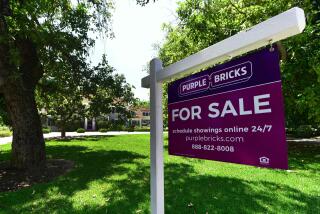White House has lost nearly a quarter of its value, Zillow says
The White House is not just an American icon. It also could be called a symbol of the American housing market, because, like many of the country’s houses, it’s not worth what it was once.
Over the last three years the president’s home and home office has lost nearly a quarter of its value. In the last month alone the value dropped almost $4 million. Does any of that sound familiar?
The 132-room mansion — 16 bedrooms and 35 bathrooms on 18 acres in the heart of the nation’s capital —was worth $331.5 million at the top of the housing boom, according to Zillow, the online real estate marketplace. But the latest “Zestimate” puts the price tag at a mere $253.1 million. That’s a 23.6% decline in value.
* * * *
Gold versus real estate
These last few years haven’t been particularly golden ones for housing. But over the long haul — say, three decades — housing has been golden. Actually, even better than gold, said Ted Jones, chief economist at Stewart Title Guaranty Co.
Jones believes that if asked to name the best long-term investment, most people would say gold. And if you considered just the last nine years or so, they would be correct. But if you go back to 1980, he said, a house would have been the better place to park your money.
Not counting transaction fees and holding costs, if you bought an ounce of gold in 1980 and held it until October, you would be ahead 95.5%, the economist figures. But if you adjust for inflation, you would have lost almost one-third of your investment.
“The value of gold in the last 30 years did not even keep up with inflation,” he said.
But if you had purchased a median-priced home in January 1980 and sold it for the median price in October 2010, Jones said, you would have notched a 252% gain, again assuming no transaction fees or holding costs. This is despite a 23% decline in values since 2006, he pointed out.
“And unlike gold, you would have been able to live in the property, reap the tax deductions for mortgage interest and property taxes, and [realize] a nontaxable gain of up to $500,000 when the house was sold,” Jones said.
Even after adjusting for inflation, housing values are still 18.6% to the good over the 30-year period, he said.
* * * *
Checking mortgage brokers’ credit
Though mortgage brokers fought it tooth and nail, all loan originators are now required under federal law to authorize the Nationwide Mortgage Licensing System to obtain their credit reports when they apply for a license or renew an existing one.
Once the system pulls a credit report, it is made available to state regulators, who can use the information to help determine the applicant’s financial responsibility and integrity.
The theory behind the provision, part of the Secure and Fair Enforcement (SAFE) for Mortgage Licensing Act of 2008, is that if a broker cannot manage his own finances, how well can he be expected to handle someone else’s?
Loan brokers who fought the provision worried that their personal credit records would be open to public scrutiny. They also argued that it is not fair to judge their fiscal competency at a time when the mortgage market has crashed and many of them are trying to remain afloat until the market rebounds.
According to Bill Matthews of the Conference of State Bank Supervisors, which operates the mortgage licensing system on behalf of state regulators, the system does not enforce any automated standard or minimum score. The SAFE Act leaves it up to each jurisdiction to develop its own processes and standards for reviewing credit information and determining an applicant’s financial capabilities.
It could be just a small part of the decision-making process or a big one, Matthews says, depending on the state.
Incidentally, with the addition of Hawaii, which went live Oct. 18, all 50 states are now part of the state-initiated licensing system effort to enhance the supervision of the residential mortgage business and protect consumers. The system tracks about 16,000 non-depository mortgage companies and 126,000 loan brokers, some of which hold licenses in several states.
Under the SAFE Act, all loan originators must be licensed or registered through the licensing system, regardless of where they work. Originators employed by insured depository institutions and their subsidiaries are to be registered on the system.
The public can determine whether a loan agent is licensed by going to https://www.NMLSConsumerAccess.org. Eventually the site also will list any disciplinary actions that may have been taken against a licensee, no matter at which company or in which state the agent worked when the action was taken.
Distributed by United Feature Syndicate.
More to Read
Inside the business of entertainment
The Wide Shot brings you news, analysis and insights on everything from streaming wars to production — and what it all means for the future.
You may occasionally receive promotional content from the Los Angeles Times.






